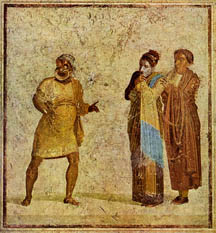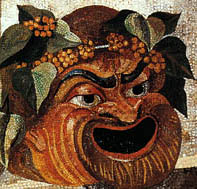
Latin 305:
Roman Comedy
Course Information
Spring, 2010
Mr. Starr


 |
Latin 305: Course Information Spring, 2010 Mr. Starr |
 |
 |
 Goals of the Course
Goals of the Course
Latin 305: Roman Comedy (the course) will introduce you to Roman comedy (the plays), one of the main sources of the Western literary tradition of comedy. Roman comedy (the plays) will make you laugh (always a good thing, especially in February and March in Massachusetts) and help you understand the Romans and Roman culture in new ways. People often think of the Romans as slave-owning, militaristic empire-builders obsessed with their obligations to family, gods, and country, and there is some truth in that. But the Romans also flocked to see raucous musical comedies and laughed at conceited soldiers being swindled and authoritarian fathers being tricked by clever slaves aiding dumb (but lovable) sons in winning the women they loved. Wildly clever verbal wit and catchy songs join crazy slapstick, and the world is turned upside down so long as the play lasts.
We'll start with selections from Plautus' Menaechmi (The Menaechmus Brothers), a mistaken-identity comedy that influenced Shakespeare's The Comedy of Errors. Then we'll read selections from Plautus' Pseudolus (the name of the main character), one of the most famous and funniest of the comedies that revolve around a clever slave (think Zero Mostel in A Funny Thing Happened on the Way to the Forum). Finally, we'll read selections from Plautus' Miles Gloriosus (The Braggart Soldier), a hugely influential play whose blustery Pyrgopolynices stands behind Shakespeare's Falstaff. Along the way we'll read other comedies by Plautus (in translation) as well as two comedies by Terence (in translation), Rome's other surviving comic playwright. We'll also read modern comedies influenced by Roman comedy to help us better understand the Roman originals and the power they continue to exert today.
So you'll learn a lot about Roman comedy, think a lot about comedy, laugh a lot (I hope!), and even substantially increase your reading speed in Latin. Plautus takes a little getting used to--he wrote long before Vergil in a genre that used much more colloquial language--, but a lot of the characters' lines are very short!). We'll work on reading techniques and vocabulary building focused specifically on reading Plautus.
 Format of the Course
Format of the Course
We'll meet twice a week for seventy minutes. There will be an assignment to read in Latin for every class meeting, supplemented by readings from other ancient authors in translation (such as comedies by the Greek Menander and the Roman Terence), modern scholarly essays for background and to spur discussion, and some modern comedies for comparison. In some class sessions there will be oral presentations (more on that on the first day of class). In class we'll do a variety of things: translate some of the Latin read as homework to make sure you understand it, discuss subjects arising out of the readings, read aloud brief scenes, maybe a little sight-reading for practice, and, if necessary, some very focused review to firm up your knowledge of specific grammar points if you have difficulties with the Latin readings. The Syllabus provides detailed information on individual assignments, presentations, postings, and tests. I'll give mini-lectures from time to time to fill in background about comedy and Roman history and culture.
Sometimes people wonder how much of the Latin homework assignments we will translate out loud in class. The answer is both very clear and not very specific: We'll translate out loud selected passages that focus on the topics we're examining that day, and we will translate any lines that you had trouble with or questions about. In every class session there will be time to ask questions about the Latin homework. It will help a lot if you let me know ahead of time where you ran into problems, so I can plan accordingly for class. Posting questions on the First Class conference works well--and then someone else may even answer your questions before class!

Texts
We'll start with selections from the Menaechmi, for which our edition has the most detailed notes, including a complete running vocabulary on the page facing the text. Then we'll move on to selections from the Pseudolus, which doesn't have a running vocabulary but does have notes. Finally, we'll read selections from the Miles Gloriosus, for which I'll figure out some kind of reading help, combining e-reserves and electronic resources.
I've ordered four (paperback) texts through the Wellesley College Bookstore and expect that they all will be available.
Other readings will be on e-reserve or web sites. Two deserve special mention:
![]()
If you want some help but not too much, move the slider a little to the right, which produces this:

If you want every word defined (perhaps the first time you read through a passage), move the slider to the far right, which would produce this:

As you can imagine, this will make your Latin life a whole lot easier! But it's not just about making your life easier: it will also allow you to read more Latin, which will make your Latin stronger and stronger. You'll read both faster and better. I want to proclaim my admiration for Lee Butterman, who wrote the program: the original version of NoDictionaries did not include the plays we'll be reading. I noticed on the web site that he said he'd add other texts upon request, so I boldly asked him to add several plays for us. He generously agreed, and I'll be figuring out a way that we can send him an electronic group Thank You card during the term! My only caution is to be careful not to become dependent on NoDictionaries: remember that you can hide the vocabulary help, which might be a good idea as you reread the lines before class and review them after class and before the translation tests.
 Requirements and Expectations
Requirements and Expectations
From time to time during the term I'll mention Extra Credit projects or put them on the Syllabus, clearly identified as Extra Credit. If you have time and feel inclined, try some! They have the potential to affect your Class Participation grade if you do several.
 On Class Participation.
On Class Participation.
You can participate in many different ways, all of them legitimate and appropriate. The crucial point is that you are contributing to the class's learning, not just to your own learning. For instance, you might:
 Grading
Grading
The final grade will be made up of these five parts:
 Instructor
Instructor
Ray Starr
Office: 301 Founders
Office hours: Monday, 12:30-1:30 (right after our class) and Thursday, 1:30-2:30
Telephone: x2627 (home: 508/359-5288, but please not before 8am or after 8pm)
Email: Raymond J. Starr (ray starr should pull it up) in First Class
I'm in my office quite a lot (I'm quite fond of my office), so don't hesitate to stop by with questions or to tell me about successes! I've also been here long enough that I usually know how things work at Wellesley and how to achieve what you want to do, so I'll happy to listen to your thoughts about courses, major plans, study abroad, or possible career plans, whether in Classics or not.
What to call me: Ray, Mr. Starr, and Professor Starr are all fine with me. Some students feel comfortable using professors' first names, but others don't (the only pattern I've ever noticed is that students from Maine are more comfortable with first names than students from other states--I don't know why). Use what feels comfortable to you and don't worry about it.
If you have a disability and need disability-related classroom or testing accomodations, please see me as soon as possible so we can make the arrangements, which are extremely easy to make. I've had lots of experience working with students with disabilities over the years, and we can call on the excellent help of Jim Wice in the Learning and Teaching Center in Clapp Library.
-------------------------------------------------------
Created by Ray Starr: 1/10
Expires: 7/10